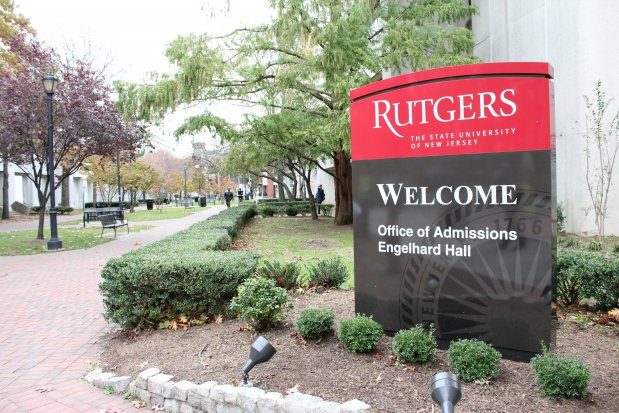Rutgers University-Newark Advisory Board Ready to Shift Into High Gear During Second Year of Service

A year ago this month, Rutgers University-Newark entered a new era. For the first time in RU-Newark history, a dedicated Advisory Board began working with campus leadership in “implementing the teaching, research, and service mission of Rutgers University-Newark, the engagement of the campus with its local community, its region, and the State, and its commitment to academic excellence, access, and diversity,” as specified in the state legislation which created the board.
The last year has been one of listening and learning for the Advisory Board, according to its chair, Oliver B. Quinn, a distinguished member of the Rutgers School of Law-Newark’s Class of 1975. As newly appointed Chancellor Nancy Cantor and the campus community worked to develop a vision and strategic plan for RU-Newark, Quinn and board members were doing their homework, meeting frequently with Cantor and other campus leaders, reviewing the input presented at campuswide listening sessions, and researching best practices among urban research universities, including Cantor’s initiatives at Syracuse University, where she served previously as chancellor and president. Once the plan is unveiled, the board will be prepared to provide whatever support it can to make the vision a reality, Quinn assures.

The Plainfield, N.J., resident is excited about the opportunities and challenges that await RU-Newark as a result of its new governing structure. “The stars are aligning nicely for RU-Newark and I am pleased to be part of it,” Quinn says. The Advisory Board and its role are the result of the legislation that integrated Rutgers University and the University of Medicine and Dentistry of New Jersey, leading to the creation of Rutgers Biomedical and Health Sciences, effective July 1, 2013.
The board’s duties, according to the state legislation, include proposing capital projects and bonding for Rutgers University-Newark to the Board of Governors (BOG) of Rutgers University. The board also will advise the Chancellor’s Office as it develops the RU-N annual operating budget and then present it to BOG. But since the revised governing structure of Rutgers is still so new, the advisory board is still shaping its active role and its relationship with the Rutgers University BOG, notes Quinn.
Quinn’s background makes him especially well suited to the task of chair of the Advisory Board. He has advised leaders in the public, private, and non-profit sectors on matters of law, ethics, public affairs, and management for more than 30 years. As principal and senior counselor at Taft and Partners, a NJ-based communications and public affairs firm, Oliver advises clients on compliance; ethics; dispute resolution; leadership development and risk, diversity, and conflict management. During his distinguished career Quinn also has served as corporate vice president and chief business ethics officer at Prudential Financial; deputy solicitor, United States Department of Labor; deputy commissioner, New Jersey Department of Labor; administrative law judge, State of New Jersey; assistant counsel, Judiciary Committee of the United States House of Representatives; and assistant dean of Rutgers Law-Newark.
He has been honored by Rutgers School of Law-Newark Alumni Association for his achievements in the field of law, receiving the Distinguished Alumnus Award in 2010.
The Advisory Board selects its chair from among its members, and members unanimously selected Quinn. He stands ready to serve another year, if his colleagues so wish when they vote again in September.
The members of the board, who receive no compensation for their work, meet at least once a semester, and at least one of those meetings per semester will be open to the public. Chancellor Nancy Cantor serves as an ex-officio, nonvoting member; two members are appointed by the Rutgers Board of Governors from among its members, and one member is appointed by the Rutgers Board of Trustees from among its members. Representatives of undergraduate and graduate student organizations, faculty organizations and staff also serve on the board. The remaining members, who are residents of the state’s northern counties, are appointed by the governor of New Jersey. (See the following list.)
Quinn is one of three Rutgers University-Newark alumni sitting on the Advisory Board. The others are Marge Derrick, a 1971 graduate of the Newark College of Arts and Sciences (NCAS), and Richard Roper, NCAS Class of 1968. Both also serve on the Rutgers Board of Governors.
The other members of the Advisory Board are:
- Cami Anderson, superintendent, Newark Public Schools
- Divij Pandya, student, president of the Student Governing Association
- Markos Papadakis, student, president of the Graduate Student Governing Association
- Clement Price, Rutgers University Board of Governors Distinguished Service Professor
- John Schreiber, CEO, New Jersey Performing Arts Center
- Sharon Taylor, senior vice president, Human Resources, Prudential Financial
- James Tepper, Rutgers University Distinguished Professor, Rutgers Center for Molecular and Behavioral Neuroscience
- Permelia Toney-Boss, Rutgers administrative staff and president of the Union of Rutgers Administrators/AFT
- Miklos Vasarhelyi, Rutgers University Distinguished Professor, Rutgers Business School
About Rutgers University – Newark
Rutgers University – Newark (RU-N) is among the leading urban research universities in the nation, and is home to the Newark College of Arts and Sciences, University College, the Graduate School –Newark, Rutgers Business School-Newark and New Brunswick, the School of Law-Newark, the School of Criminal Justice and the School of Public Affairs and Administration, joint programs with the Rutgers Biomedical and Health Sciences campus at Newark, and extensive research and outreach centers. RU-N offers 42 undergraduate programs, 33 master’s programs, and 22 doctoral programs. Rutgers University-Newark, which enrolls more than 12,000 undergraduate and graduate students on a 38-acre-campus in downtown Newark, is among the nation’s most diverse national universities, with a student body that has no ethnic majority group.
Throughout its 100-year- plus history of providing higher education, the university has been an anchor institution in the state’s largest city, working towards the advancement of its citizens and its institutions.
Established in 1766, Rutgers, The State University of New Jersey, is America’s eighth oldest institution of higher learning and one of the nation’s premier public research universities. Serving more than 65,000 students on campuses in Camden, Newark and New Brunswick, Rutgers is one of only two New Jersey institutions represented in the prestigious Association of American Universities.